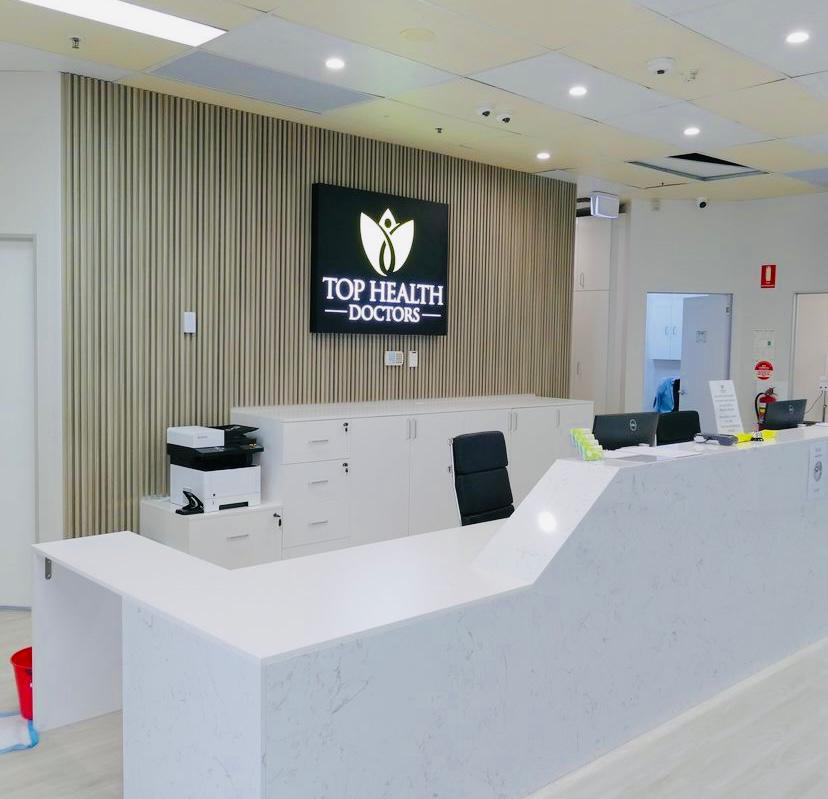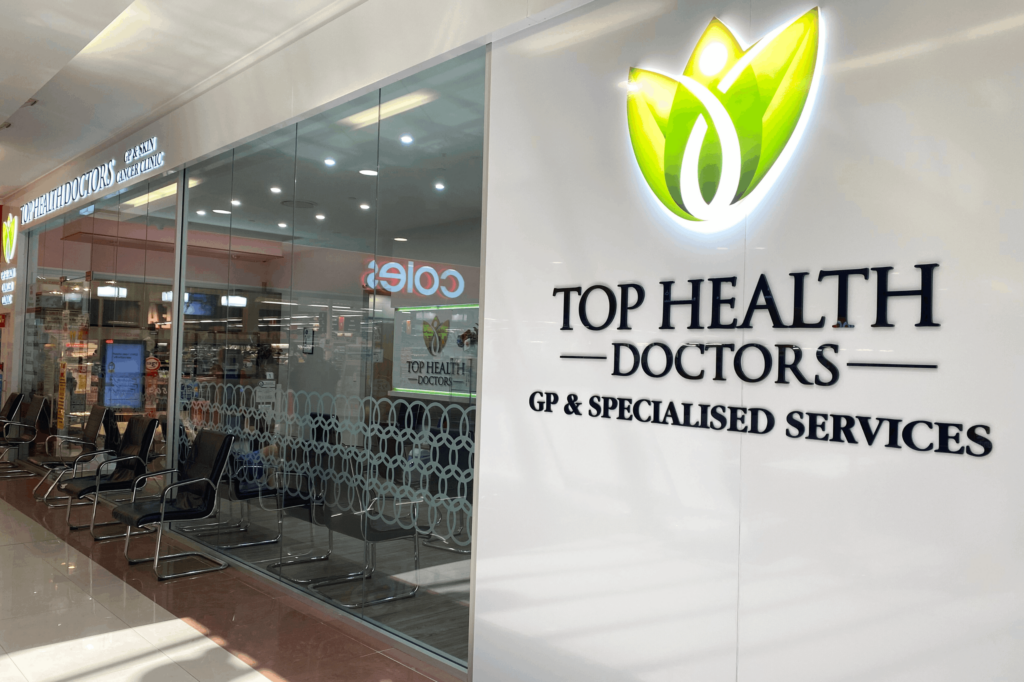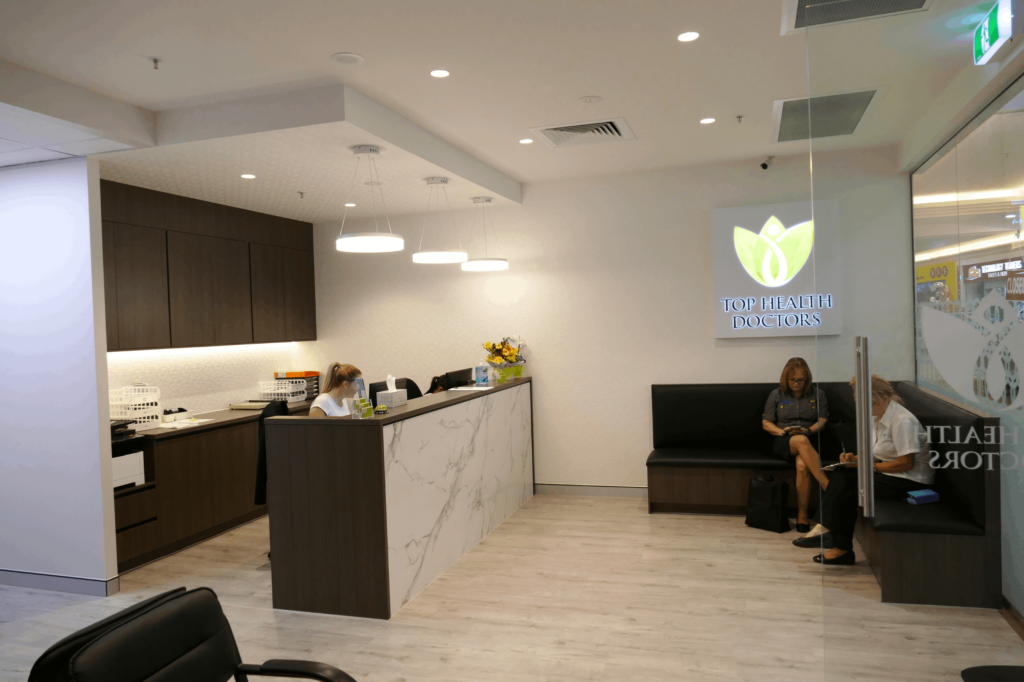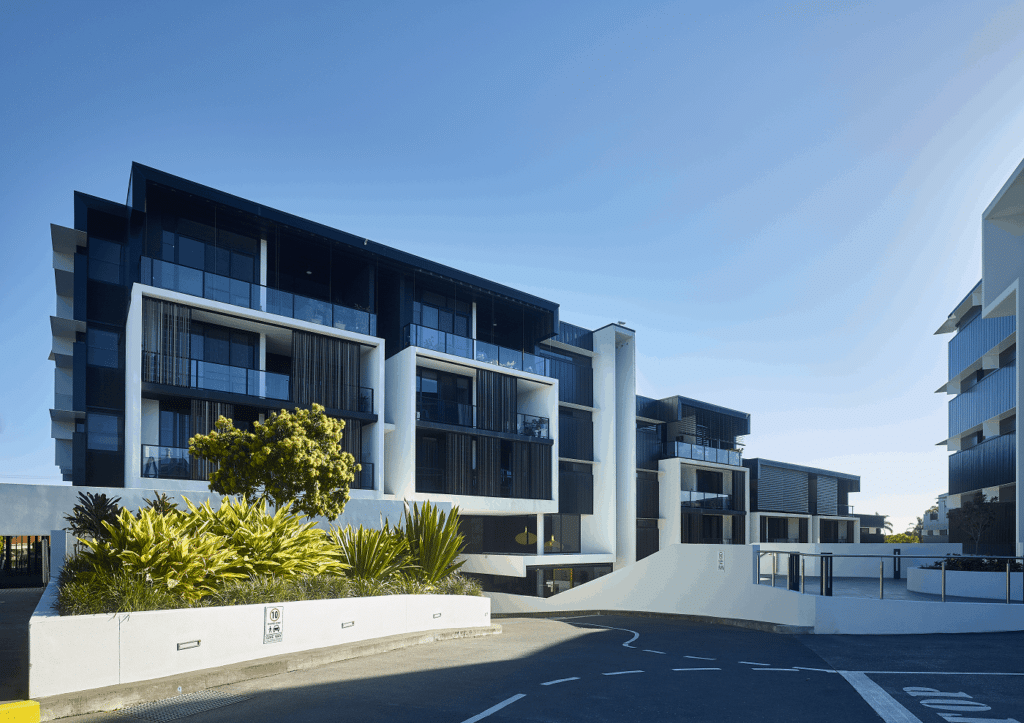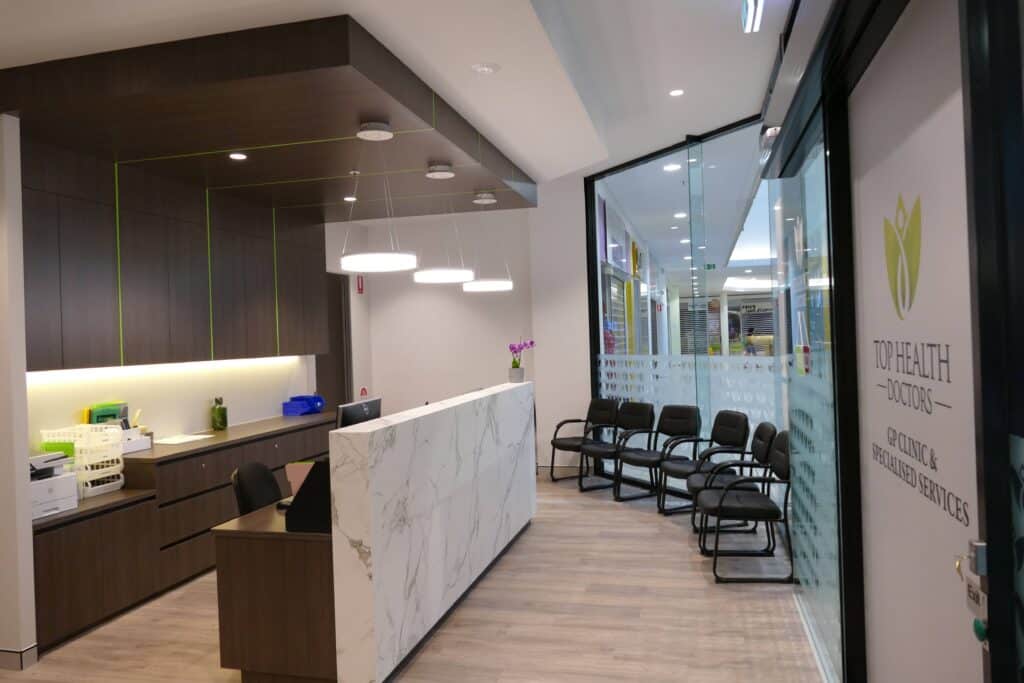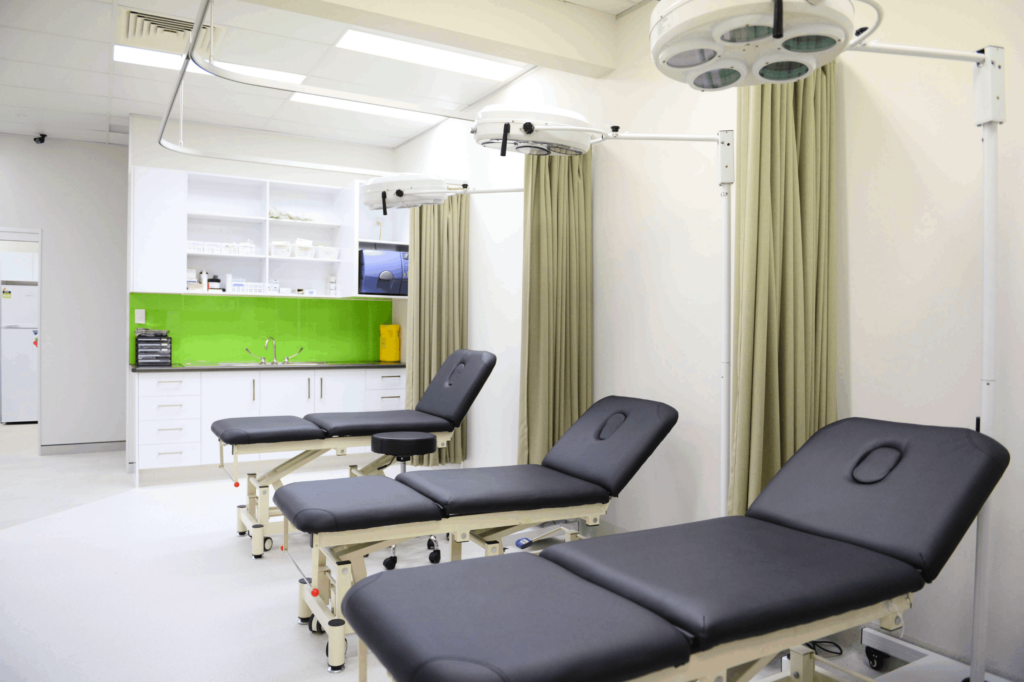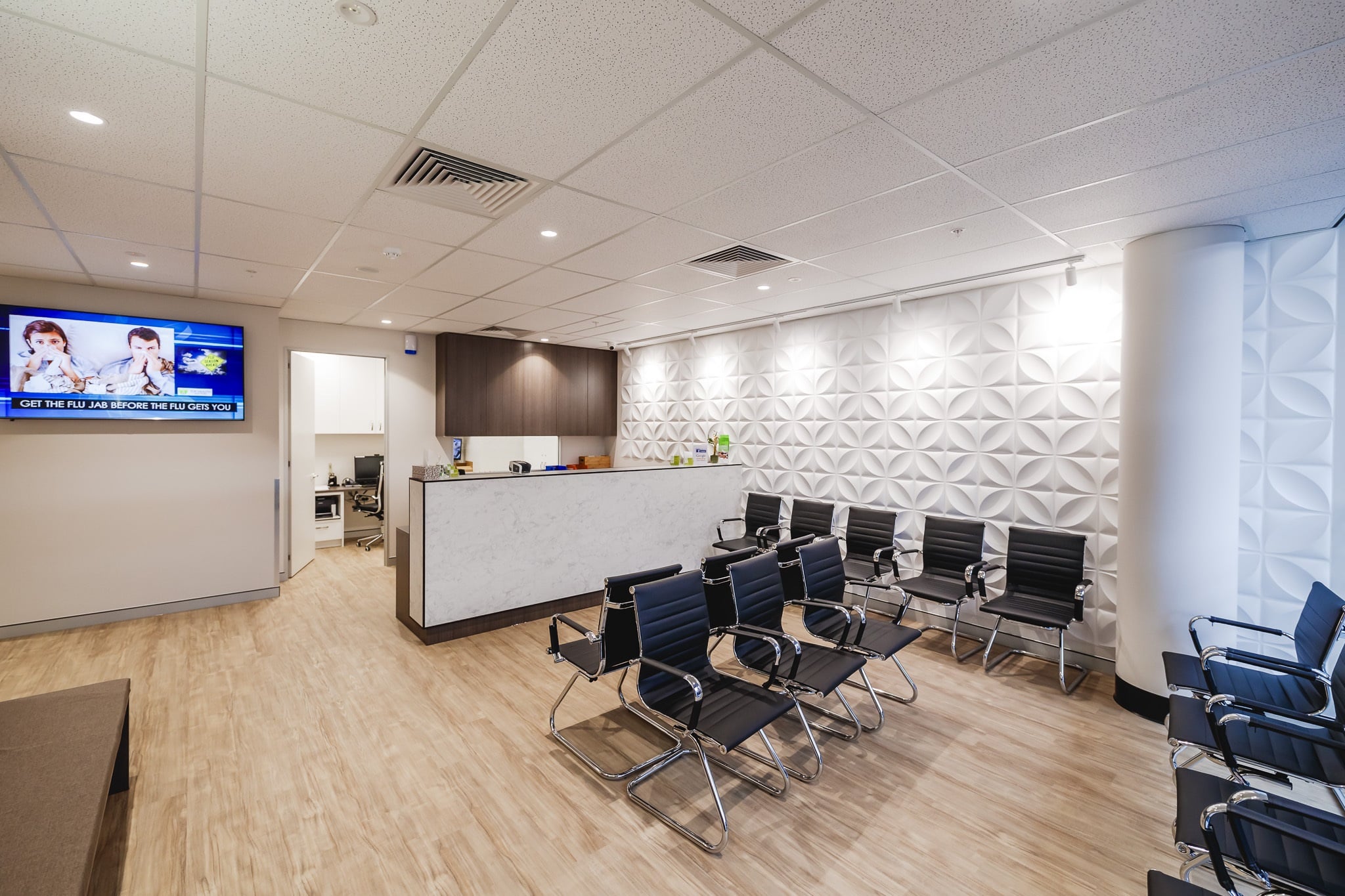- Our Practices
- -
- Skin Cancer Clinics
Brisbane Skin Cancer Clinics
It’s important for you to take the time for self-skin checks. Print off these flyers for further information:
Have you booked your Skin Check Consultation?
Skin Cancer Clinics servicing Brisbane / Logan
Two in three Australians will be diagnosed with skin cancer at some point in their life. Skin cancer is the most common type of cancer in Australia.
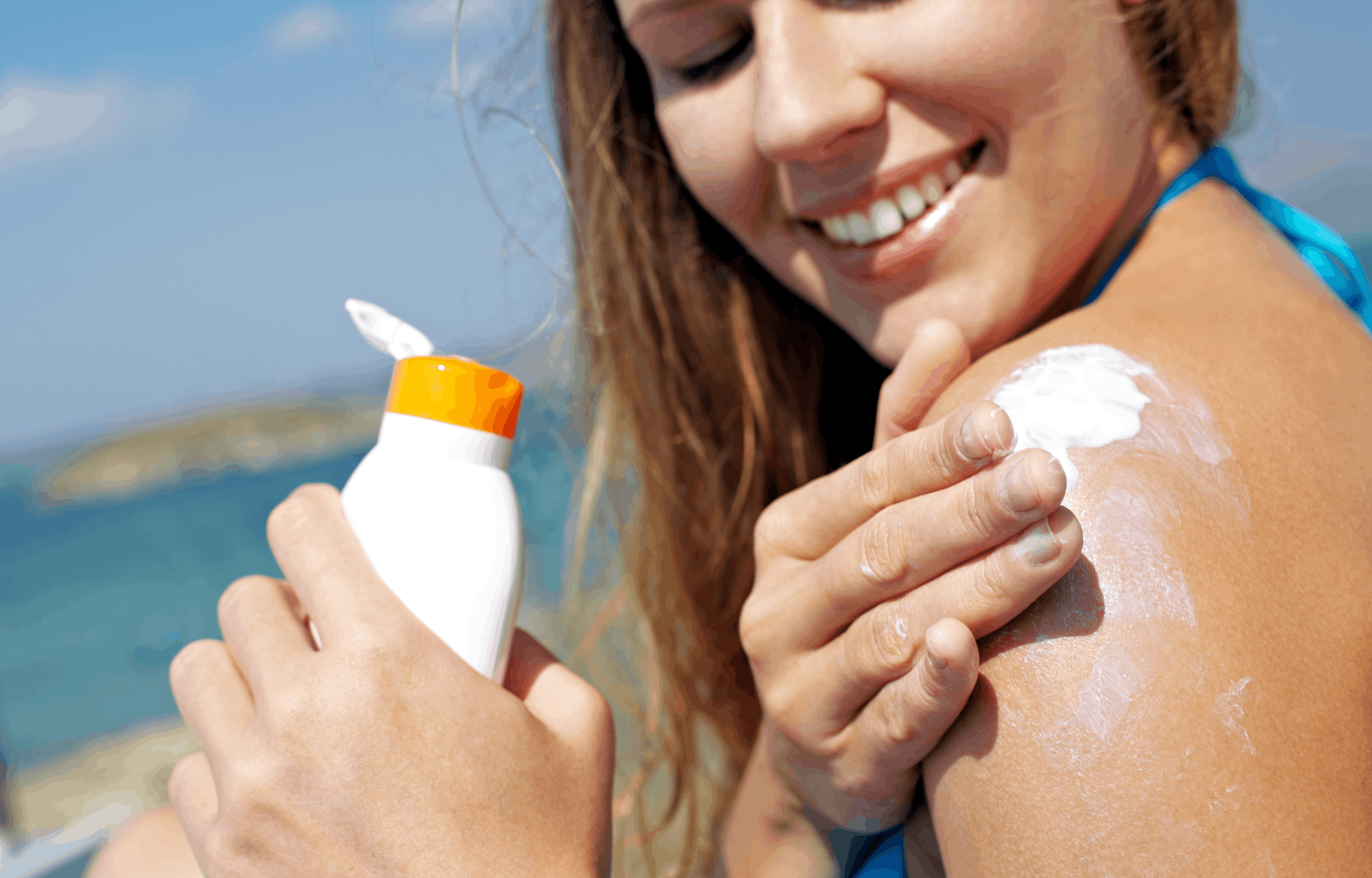
Early Detection of skin cancer saves lives
Top Health Doctors Skin Cancer Clinics in Brisbane provide comprehensive and compassionate care in the fight against skin cancer, placing a strong emphasis on prevention and protection. Our healthcare professionals are committed to providing comprehensive screenings, expert advice, and personalised strategies to keep your skin safe under the sun. We believe that knowledge is the ultimate shield against this prevalent disease. The Top Health Doctor’s team of highly trained and dedicated professionals are committed to empowering you with the tools and information needed to help safeguard your skin from harmful UV rays. Together, we strive to create a sun-safe community, fostering a proactive approach to skin health that will last a lifetime.
Visit our information pages about skin cancers, risks, how to regularly check your skin at home and Top Health Doctors Skin Check consultations. Book a skin check near you today. Brisbane Skin Cancer Clinics are in Beenleigh, Cannon Hill, Capalaba, Coorparoo, Greenslopes, Underwood or West End.
Are you at risk of skin cancer?
Raising awareness of skin cancer risks
Being a group of medical centres and skin cancer clinics, raising awareness about the risks of skin cancer is a high priority for us.
It is important to recognise that certain individuals are at higher risk of developing skin cancer due to various factors. We are here to provide comprehensive skin checks, education, and guidance to all and especially those at higher risk. By understanding and addressing these risk factors, we can work together to promote early detection, prevention, and effective management of skin cancer, ensuring optimal care for all our patients.

Are you at risk of skin cancer?
The following group of people are at increased risk of Skin Cancer
- Are you fair skinned and you do not tan but burn easily under the sun?
- Work outdoors and have a lot of sun exposure?
- Do recreational activities that involve a lot of sun exposure?
- A history of repeated episodes of sunburn and blistering, especially in your childhood and adolescence?
- Are you older than 50 years with fair skin?
- Are you from an Anglo-Celtic (Scottish, Irish or Welsh) background with red hair and blue eyes?
- Did you grow up in a high sun exposed country e.g., Australia, New Zealand?
- Have a history of a skin cancer of any type?
- Family history of skin cancer especially Melanoma?
- Are you an organ transplant recipient?
- History of exposure to radiation / UV therapy?
- Do you have a history of exposure to heavy industrial chemicals including coal tar, asphalt, petroleum derivatives, arsenic and others?
- Have you got moles or unusual looking moles on your body?
What is Skin Cancer?
What are the different types of skin cancers?
Skin cancer is a disease of the body’s skin cells, caused mainly by cumulative exposure to ultraviolet radiation from the sun. It is a group of diseases in which cells are aggressive (grow and divide without respect to normal cell limits), invasive (invade and destroy adjacent tissues), and sometimes metastatic (spread to other locations in the body).
Skin cancer usually begins in the outside layer of the skin, called the epidermis. The different skin cancers are named after the type of cell they start from in the epidermis:
- Basal cells (Basal Cell Carcinoma),
- Squamous cells (squamous cell carcinoma) and
- Melanocytes (Melanoma)
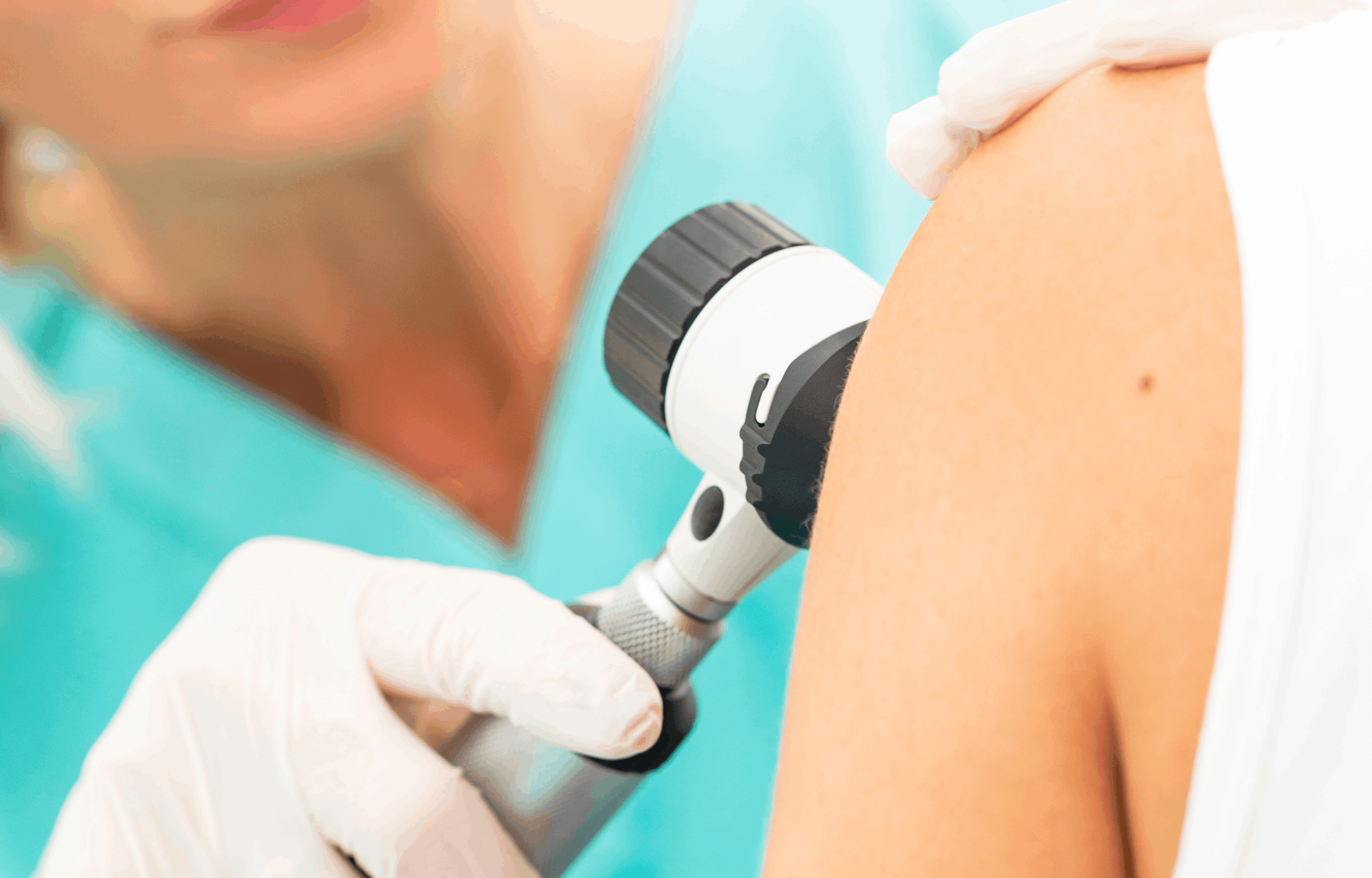
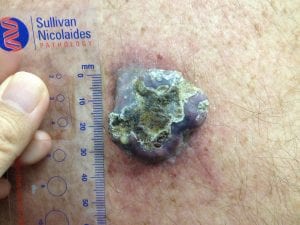
What is a Melanoma
Melanoma is the most dangerous skin cancer. Melanomas make up only about 5% of all skin cancers.
Queensland has the highest incidence of melanoma per head of population in the world. One in 16 men and one in 24 women in Queensland will develop a melanoma in their lifetime.
If left untreated, it can possibly spread to other parts of the body and be fatal. Melanomas can be either flat or lumpy spots with or without dark pigmented colour. It may develop in people with limited sun exposure and develop on regions of the skin not regularly exposed to the sun e.g., in between the toes.
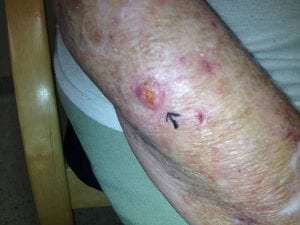
What is a Squamous cell carcinoma (SCC)
Squamous cell carcinoma (SCC) normally appears as a thickened red, scaly spot that may bleed easily or ulcerate. SCC makes up about 20% of all skin cancers. SCC usually grows slowly over months and can spread to other parts of the body if left untreated, especially in the head and neck areas.
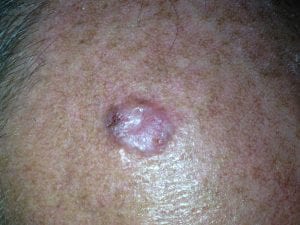
What is a Basal cell carcinoma (BCC)
Basal cell carcinoma (BCC) is the most common form of skin cancer, and is responsible for 75% of all skin cancers. It appears as a pearly lump or area that is red or pale in colour. It may become ulcerated, bleed and fail to heal.
What is Dermoscopy?
A full comprehensive skin check with a dermascope
Dermoscopy is an imaging technique used by doctors during skin checks to examine skin lesions more closely. It involves the use of a handheld device called a dermatoscope, which provides a magnified view of the skin’s surface and allows for the visualisation of structures that are not visible to the naked eye.
Dermoscopy aids in the early detection and differentiation of various skin conditions, including skin cancers like melanoma, basal cell carcinoma, and squamous cell carcinoma, as well as benign moles and other dermatological disorders. Dermoscopy is performed using a dermatoscope which consists of a magnifier, a light source (polarized or non-polarised), a transparent plate and sometimes a liquid medium between the instrument and the skin. By analyzing specific patterns, colors, and structures observed through dermoscopy, healthcare providers can make more accurate assessments of skin lesions and determine whether further investigation or biopsy is necessary.
Top Health Doctors Clinics offer our patients a full comprehensive skin check. This involves a detailed history and the examination of your skin, from head to toe, using simple magnification, and dermoscopy
Skin checks and treatment of skin cancer lesions
- Full body skin cancer check
- Skin biopsy
- Simple skin cancer excision
- Advanced skin cancer excision with flap repair
- Advanced skin cancer excision with split skin graft repair
Peace of Mind
Any spots of interest are recorded and analysed. On some occasions, we take clinical pictures. This forms part of your medical record for future comparison and may help our treatment decisions.
Your skin of your full body is checked to ensure a thorough skin check is provided. However, a more targeted examination may be performed if a patient so desires e.g., back only, exposed areas only, or even just a single spot about which you may be concerned.
To help us examine your skin thoroughly, we prefer you NOT to wear make-up (especially foundation) and nail polish.
Treatment may be carried out at the time of consultation if time permits, e.g., cryotherapy (freezing with liquid Nitrogen) or perhaps a biopsy (taking a small piece of skin lesion, under local anaesthetic, to be looked at under the microscope).
Patients who need to undergo surgical excisions will be given a detailed explanation of the procedure and potential risks. Such surgical excisions are usually scheduled at a separate appointment.
Do regular skin checks
Although skin cancer is very common amongst us, most skin cancers are treatable if found early. Regular Self Skin Checks are very important
How to do a self skin check
- Make sure you have a long mirror and use a well-lit area.
- Someone else may be able to help you check areas that are hard to examine by yourself e.g., your back.
- If a change in colour, size, shape or texture of a spot is noticed, please make an appointment to see one of our skin cancer doctors.
- Click onto Skin check part 1 and thereafter Skin check part 2 below to see how you can perform a Step-by-Step Self Skin Check.
- Do this regularly, on either the 1st of the month or the 1st day of each season
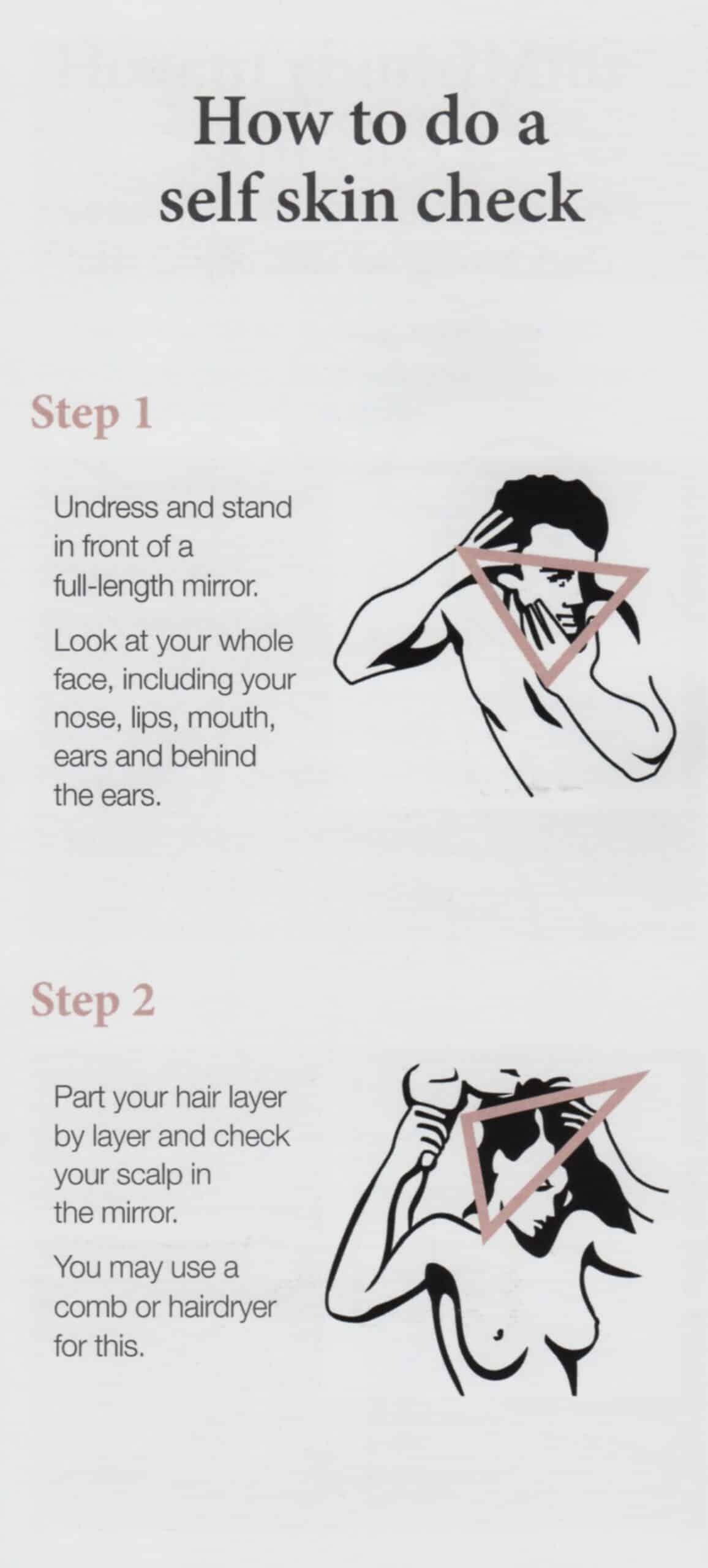
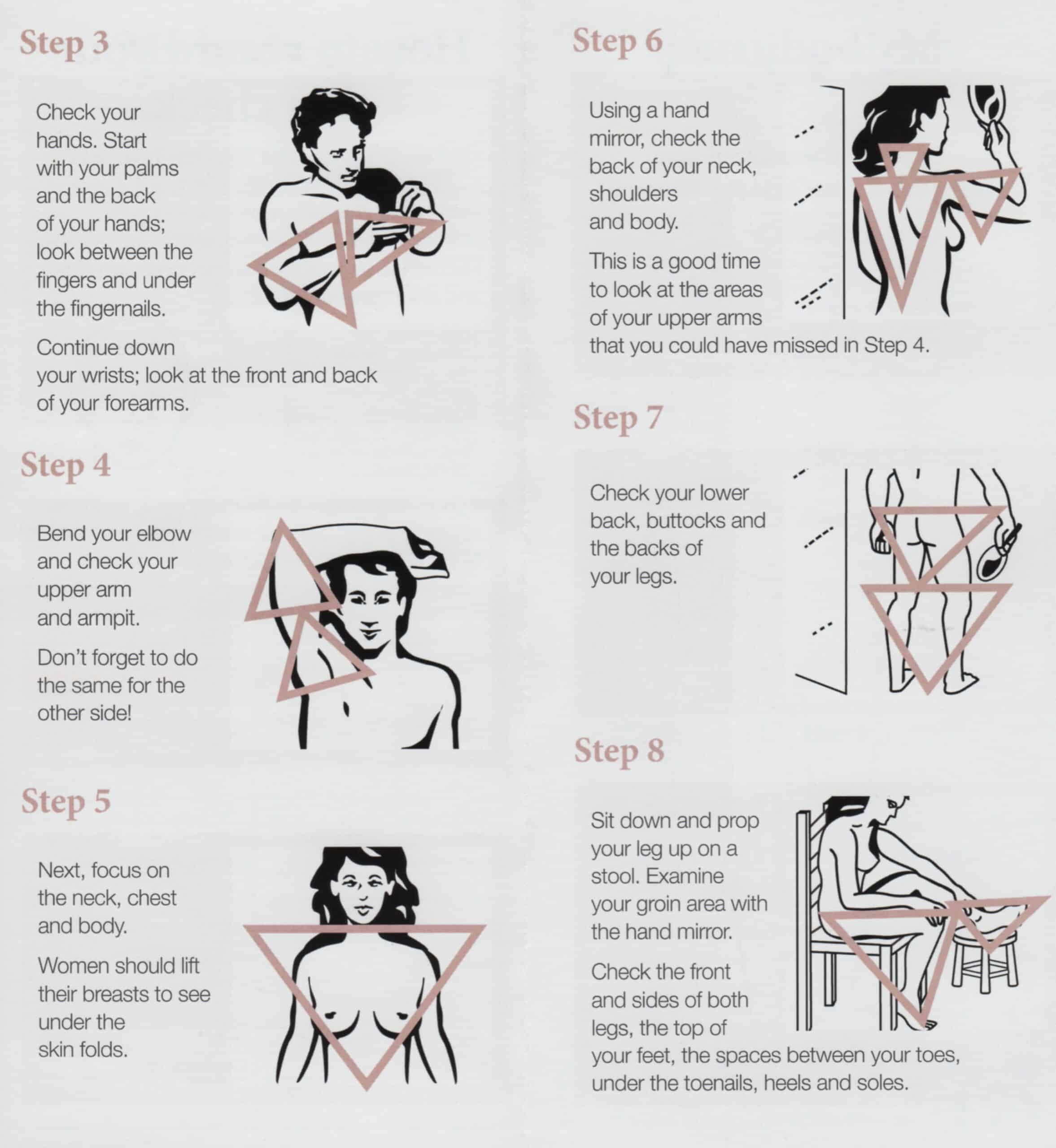
The pictures of the Guide are kindly provided by Leo Pharma.
How to do a self-skin check
Protect yourself from the sun
Staying Safe in the Queensland Sun
Being sun safe, especially in Queensland, is of utmost importance due to the high levels of ultraviolet (UV) radiation in this region. Queensland is known for its beautiful sunny climate, but it also has one of the highest rates of skin cancer in the world. The combination of proximity to the equator, clear blue skies, and our wonderful outdoor lifestyle increases the risk of harmful UV exposure.
Here are some key ways to protect yourself and your family:
- Stay in the shade whenever you can. This is especially during 10 am to 3 pm when the UV intensity is at its peak.
- Slip on sun protective clothing
- Slap on a broad brim hat
- Slop on a broad-spectrum SPF 30+ or 50+ water resistant sunscreen
- Slide on your sunglasses (Australian Standard AS 1067)
Preparation for your skin examination
Information for your skin check appointment
Please read through the booklet: Your Skin Examination Guide
Or download this booklet here
Top Health Doctors is a caring team of health professionals with a patient centred care approach.
Our Doctors care for families with babies and young children through to the elderly of our community of many cultural backgrounds from many walks of life.
